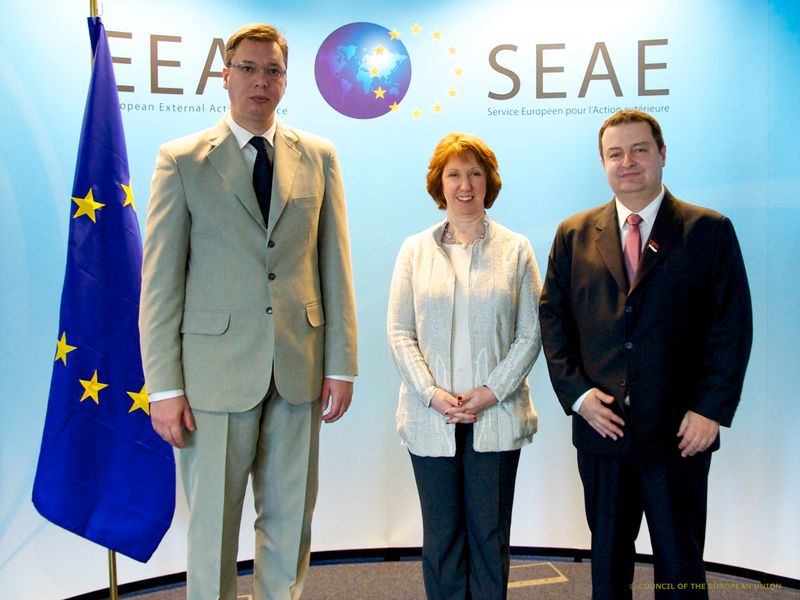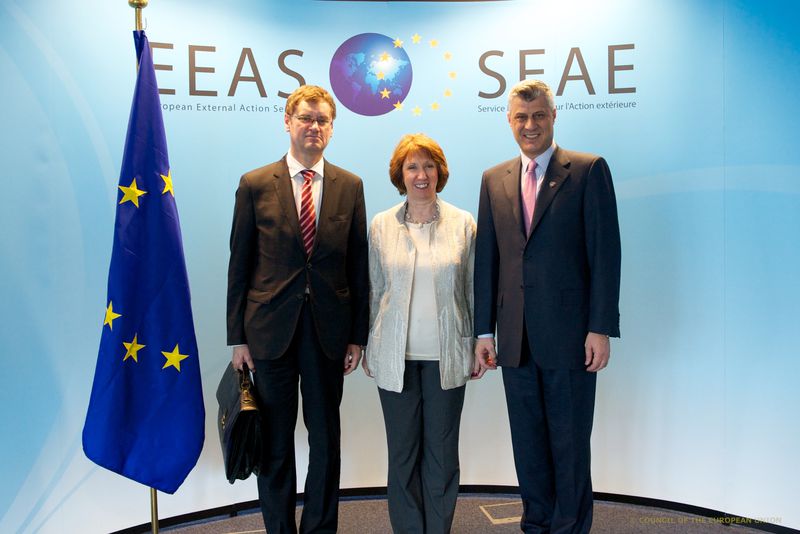Serbia Has To Make a Vital Choice
Adelina Marini, April 5, 2013
 Serbia's time is running out and the government in Belgrade realises this very well. The European Union has put a condition to Belgrade that in June it will receive a date for the beginning of accession negotiations, but only if it reaches an agreement with Pristina under the special dialogue facilitated by the Union. The year started dynamically with regular, almost weekly, meetings at highest level, attended even by President Tomislav Nikolic. It seemed as if Serbia was ready to turn a new page and irreversibly choose the European path. Until April 2nd when the 8th round of negotiations took place and ended after almost 14 hours of talks with a semi announced sentence. Serbia has to make a vital choice by Tuesday, April 9th either to choose the EU or Kosovo.
Serbia's time is running out and the government in Belgrade realises this very well. The European Union has put a condition to Belgrade that in June it will receive a date for the beginning of accession negotiations, but only if it reaches an agreement with Pristina under the special dialogue facilitated by the Union. The year started dynamically with regular, almost weekly, meetings at highest level, attended even by President Tomislav Nikolic. It seemed as if Serbia was ready to turn a new page and irreversibly choose the European path. Until April 2nd when the 8th round of negotiations took place and ended after almost 14 hours of talks with a semi announced sentence. Serbia has to make a vital choice by Tuesday, April 9th either to choose the EU or Kosovo.
Brussels and the member states have been reiterating that no one requires from Serbia to recognise Kosovo in order to become a full fledged member, but the EU also states very clearly that it does not want to import unresolved bilateral problems as such a precedent there already is with Cyprus and as of 1st of July there will be another with Croatia and Slovenia which did not succeed in resolving a dispute that threatened with a failure of Zagreb's accession. It's true that Kosovo is too far from membership, but if Serbia makes the European decision then for it the perspective will not be as distant. That is why Brussels hardened the tone.
In the end of the marathon talks with the participation of the prime minsters of Serbia and Kosovo - Ivica Dacic and Hashim Thaci - EU's High Representative for Foreign and Security Policy baroness Ashton said: "This is the last time we will meet formally. A number of proposals were put on the table. The gap between the two sides is very narrow, but deep. They will now both go back and consult with their colleagues in the capitals and will let me know in the next few days of their decision. I wish them a
good journey home and every possible success in reaching a conclusion". The message is very clear - EU's facilitation is depleted, it's time for decisions (a choice).
The conflict
The most controversial element of the talks between the two countries is related to the powers of the municipalities with predominantly Serb population in Kosovo. The talks are based on the plan of the special UN envoy for Kosovo of 2007, former President of Finland Marti Ahtisaari. In his plan for the resolution of the status issue of Kosovo it is envisaged the communities that are not a majority in the country to be guaranteed that they will be represented in the Kosovo parliament. Besides, it is envisaged those municipalities to be provided with possibilities to define themselves the laws that are of specific interest to them. The plan also foresees a decentralisation of the Kosovo municipalities, aimed precisely at the needs of the Kosovo Serb minority and which is to give them a higher degree of control over their own affairs.
This means that these municipalities will be provided with enhanced community competences on issues like health care and higher education, an expanded community autonomy on financial issues, including the possibility to receive transparent financing from Serbia. Also allowed are inter-municipal partnerships and trans-border cooperation with the Serbian institutions. The key is in the establishment of six new or significantly expanded municipalities with predominantly Serb population. This is what the Ahtisaari plan says.
The plan that is discussed in the framework of the dialogue with the EU's facilitation is based on Ahtisaari's proposal and contains eight points which envisage the establishment of an association of Serb municipalities in Kosovo. The key word here is 'association' because the meaning of the word was widely discussed in Serb media. That is why in the text of Lady Ashton's plan it is written Association/Community. The plan envisages the association to have a statute of its own which, however, will be based on the model of work of the association of the Kosovo municipalities. The competences of the association will focus on economic development, education, health care and other issues of common interest or importance. The association commits to implement also all other obligations that in the future could be imposed by the central authority.
The last, 8th point envisages as early as this year local elections to take place in the northern municipalities with the help of the OSCE, on the basis of the Kosovo laws and the international standards. The plan is not officially published and was distributed on the internet page of the Serb national TV RTS. In an interview for the central news programme of the TV station on April 3rd Alexandar Vucic, the first deputy prime minister of Serbia, explained that the point of conflict in the negotiations was the demand of the Serbian side four municipalities in the northern part of Kosovo to have a Serb for a regional major, while the Albanians stated that under the Kosovo laws there are seven municipalities in the region to which additional three must be added, thus making the Albanians a majority in that part of the country.
According to Vucic, there where the Serbs have a majority of 98% if the Albanians added municipalities with predominantly Albanian population they change the proportion to 86% Albanians against 14% Serbs. This is precisely what Belgrade refused to endorse. After three hours of negotiations, the first Serbian deputy premier tells the TV, a compromise was tabled, according to which only two municipalities will be added, but this again leads to domination of the Albanians in a proportion of 65 to 35 per cent.
Serbia's dilemma
In the very dramatic interview which rather resembled a confession on Serb national TV (state-owned), Vucic explained that Serbia was facing two equally bad choices. Serbia will not get a date to begin accession negotiations unless it accepted the proposed deal. Belgrade has time until Tuesday afternoon to decide. On the one hand, Vucic said, if we choose the EU this will be a very bad decision for our fellow citizens in Kosovo. But if we rejected the EU proposal we will remain isolated from the entire world which will have really bad implications for the economy and our politics, he added. Serbia is between the hammer and the anvil, Alexander Vucic continued with a dramatic tone, making huge pauses in between sentences.
He blamed the Kosovo side of using "tricks" in the talks and that Kosovo had more support than Serbia. A thesis which was defended by Prime Minster Ivica Dacic who during his official visit in Paris this week said that Serbia had no true friends in the West - "not such that can be on our side, but friends who will have greater understanding for our position on important issues that torment the Balkans", Mr Dacic underlined before journalists after his talks with French Prime Minster Jean-Marc Ayrault. Serbia is under  great pressure, in a marsh where it is sinking deeper and deeper every year because there is no way what we stand for to reach those who make the decisions in the EU, the Serbian premier added.
great pressure, in a marsh where it is sinking deeper and deeper every year because there is no way what we stand for to reach those who make the decisions in the EU, the Serbian premier added.
For RTS Alexander Vucic rejected the possibility for consultations in the parliament of Serbia because in his words there was no document to be shown to the MPs. The opinions in the Skupstina are well known and I can even now tell you who will say what, said Vucic. It is not clear in that situation for what type of "consultations" will Serbia use its time until Tuesday, as is written in Baroness Ashton's statement. Will it be to prepare society for the decision or for internal political decisions. A few months ago in Belgrade a rumour had it that early elections were to be expected this year. This rumour has re-emerged this week and it is not to be excluded the scapegoat after the decision is announced to be Alexander Vucic - the right hand of President Tomislav Nikolic in the government of Ivica Dacic who is not in very warm relations with the president.
If Serbia accepts the compromise this will mean that the path will be cleared for a recognition of Kosovo's independence some time in the future because this agreement is weakening Serbia's control over the municipalities with predominantly Serb population in Kosovo. The weakening of the Serbian control will mean enhancing Kosovo's and that could lead to the dissolution of the Serb majority in the northern communities. That is why the moment is so dramatic for Serbia. So far, not even one country's decision was firmly pro-EU. Even President Nikolic said last year that EU membership could not be at any price.
But now Belgrade is facing a firm choice and the price is already clear and was formulated by Suzana Grubjesic as well, deputy prime minister for European integration, quoted by the Tanjug news agency: "My party believes that a rejection of the agreement would mean another turning of our backs to the future and in the long term it would push Serbia out in a political and economic isolation which we will endure really hard". And according to Vucic, a problem also is how a possible decision would be accepted by the Serbian people in Kosovo and also by "the rest of the Serb people". The big question, however, is how will the people be asked. There is no time for a referendum. Remains the possibility of early elections, but the decision will have been made anyway. So, the only possibility is simply to prepare the public until Tuesday for the decision.
 Bakir Izetbegovic, Andrej Plenkovic | © Council of the EU
Bakir Izetbegovic, Andrej Plenkovic | © Council of the EU Aleksandar Vucic, Recep Tayyip Erdogan | © Serbian Presidency
Aleksandar Vucic, Recep Tayyip Erdogan | © Serbian Presidency Jean-Claude Juncker, Zoran Zaev | © European Commission
Jean-Claude Juncker, Zoran Zaev | © European Commission